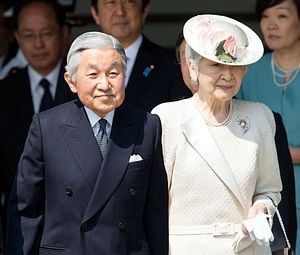Japanese Emperor Akihito and Empress Michiko made a state visit to the Philippines from January 26 to 30, 2016. It was the first official visit by the Japanese emperor and empress to Southeast Asia.
The imperial visit has attracted attention in the context of growing security ties between Japan and the Philippines. The boost of the relationship between Tokyo and Manila, particularly their security relations, has been unfolding in the face of increasing assertiveness from China in the Asia-Pacific region. That has sparked a growing need felt by Southeast Asian countries, including the Philippines, to seek a security partner that can complement the U.S. role as a security guarantor in the region. Japan, a close ally of the United States that also has been looking at developing a more robust security profile in the region to counter growing muscle-flexing by Beijing, is a desirable partner. The Trans-Pacific Partnership (TPP) agreement reached last year would certainly buttress Japan’s further engagement in Southeast Asia in the areas of trade and investment, from which Manila (though not yet a TPP member) would benefit.
On the part of Emperor Akihito and Empress Michiko, however, their visit was as much about the history of Japan-Filipino relations as much as about its future. In particular, this was a critical part of their effort to continue to remember Japan’s wartime past.
The imperial couple is known to be personally committed to remembering the past. Since then-Crown Prince Akihito spoke about his family designating four days — the day that Battle of Okinawa ended (June 23), the day an atomic bomb was dropped on Hiroshima (August 6), the day an atomic bomb was dropped on Nagasaki (August 9), and the day of Japan’s unconditional surrender (August 15) — as O-tsutsushimi-no-hi (days of remembrance) in 1981, he and Empress Michiko have articulated the importance of Japan not forgetting the damage it inflicted on its own people as well as the people in Asia and other countries.
His sentiment came through vividly in his remarks at the commemoration ceremony for the victims of World War II, in which he expressed his “renewed sense of sorrow” and “feeling of deep remorse of the last war.” Furthermore, when asked to reflect on the year 2015, the 70th anniversary of the war’s end, at the press conference on his birthday, the emperor said he spent “much time thinking about the war in various ways. With each passing year, we will have more and more Japanese who have never experienced war, but I believe having thorough knowledge about the last war and deepening our thoughts about the war is most important for the future of Japan.”
The imperial couple’s personal commitment to remembrance has been demonstrated through their strong desire to visit the places in the Asia-Pacific region where the Japanese military fought during World War II. Their saga began as early as 1975 when Emperor Akihito, then Crown Prince Akihito, visited Okinawa for the first time in 1975. He would visit Okinawa, the only Japanese territory that experienced ground fighting during World War II, a total of five times while he was crown prince, and also visited Okinawa after becoming Emperor in 1993. In 2005, the 60th anniversary of World War II, the couple visited the Northern Mariana Islands, where the Japanese and U.S. militaries engaged in an intense battle. Last year, despite considerable logistical challenges, they visited Palau to remember those who perished during the battle there.
While the Japanese government’s official reason for the imperial visit was to commemorate the 60th anniversary of Japan-Philippines diplomatic normalization, it was clear that the imperial couple’s primary purpose was to pay respect to those who perished in the Philippines during the war. Their itinerary included visits to not only the memorials for Japanese who died in the Philippines during the war but also the tombs of unknowns, where Filipinos who fell victim to the ground battle between Japanese and American militaries are enshrined. Both in his remarks at the departure for the trip and during the dinner hosted by Philippine President Benigno Aquino III, Emperor Akihito talked about the loss of lives of “innocent Filipinos” and said this wartime history would be in their hearts throughout the visit.
For those in Japan who lament why the country always has to be criticized for its wartime past, the enduring commitment demonstrated by Emperor Akihito and Empress Michiko and the responses by those who have been at the receiving end of their outreach — in Okinawa, in Palau, in the Philippines — teaches a valuable lesson. On the part of Japan, only having the strength to make continuous efforts in remembering the past can lead to the possibility of reconciliation. At the same time, it also requires strength on the part of the countries and people that were once victimize to have a sense of “forgive, but not forget.”

































